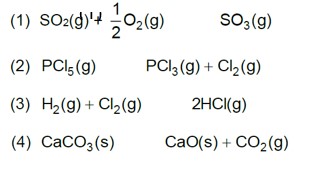7.26. Which of the following reactions will get affected by increasing the pressure? Also mention whether the change will cause the reaction to go into forward or backward direction.
(i) COCl2 (g) ⇌ CO (g) + Cl2 (g)
(ii) CH4 (g) + 2S2 (g) ⇌ CS2 (g) + 2H2S (g)
(iii) CO2 (g) + C (s) ⇌ 2CO (g)
(iv) 2H2 (g) + CO (g) ⇌ CH3OH (g)
(v) CaCO3 (s) ⇌CaO (s) + CO2 (g)
(vi) 4NH3 (g) + 5O2 (g) ⇌ 4NO (g) + 6H2O (g)
7.26. Which of the following reactions will get affected by increasing the pressure? Also mention whether the change will cause the reaction to go into forward or backward direction.
(i) COCl2 (g) ⇌ CO (g) + Cl2 (g)
(ii) CH4 (g) + 2S2 (g) ⇌ CS2 (g) + 2H2S (g)
(iii) CO2 (g) + C (s) ⇌ 2CO (g)
(iv) 2H2 (g) + CO (g) ⇌ CH3OH (g)
(v) CaCO3 (s) ⇌CaO (s) + CO2 (g)
(vi) 4NH3 (g) + 5O2 (g) ⇌ 4NO (g) + 6H2O (g)
Only those reactions will be affected by increasing the pressure in which the number of moles of the gaseous reactants and products are different (i.e. when np ≠ nr) (gaseous). In general,
- The reaction will go to the left if np> nr.
- The reaction will go to the right if nr> np.
Keeping this in mind,
(
Similar Questions for you
0.01 M NaOH,
M = 1 * 10-2

pOH = 2
pH = 2
Kp = Kc (RT)Dng
36 * 10–2 = Kc (0.0821 * 300)–1
Kc = 0.36 * 0.0821 * 300 = 8.86 » 9
A(g) ->B(g) + (g)
Initial moles n 0 &nbs
On increasing pressure, equilibrium moves in that direction where number of gaseous moles decreases.
Taking an Exam? Selecting a College?
Get authentic answers from experts, students and alumni that you won't find anywhere else.
On Shiksha, get access to
Learn more about...

Chemistry Ncert Solutions Class 11th 2023
View Exam DetailsMost viewed information
SummaryDidn't find the answer you were looking for?
Search from Shiksha's 1 lakh+ Topics
Ask Current Students, Alumni & our Experts
Have a question related to your career & education?
See what others like you are asking & answering


